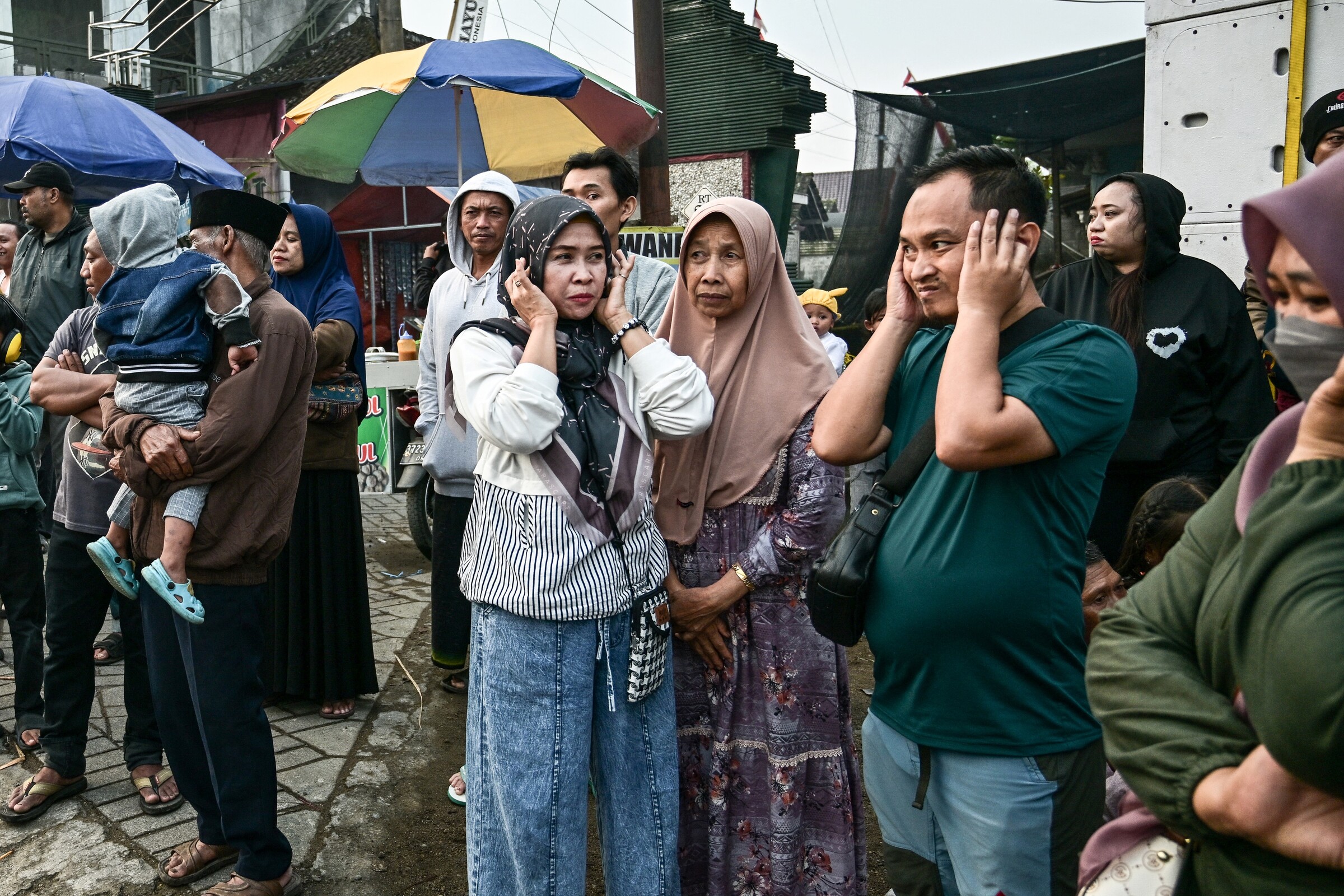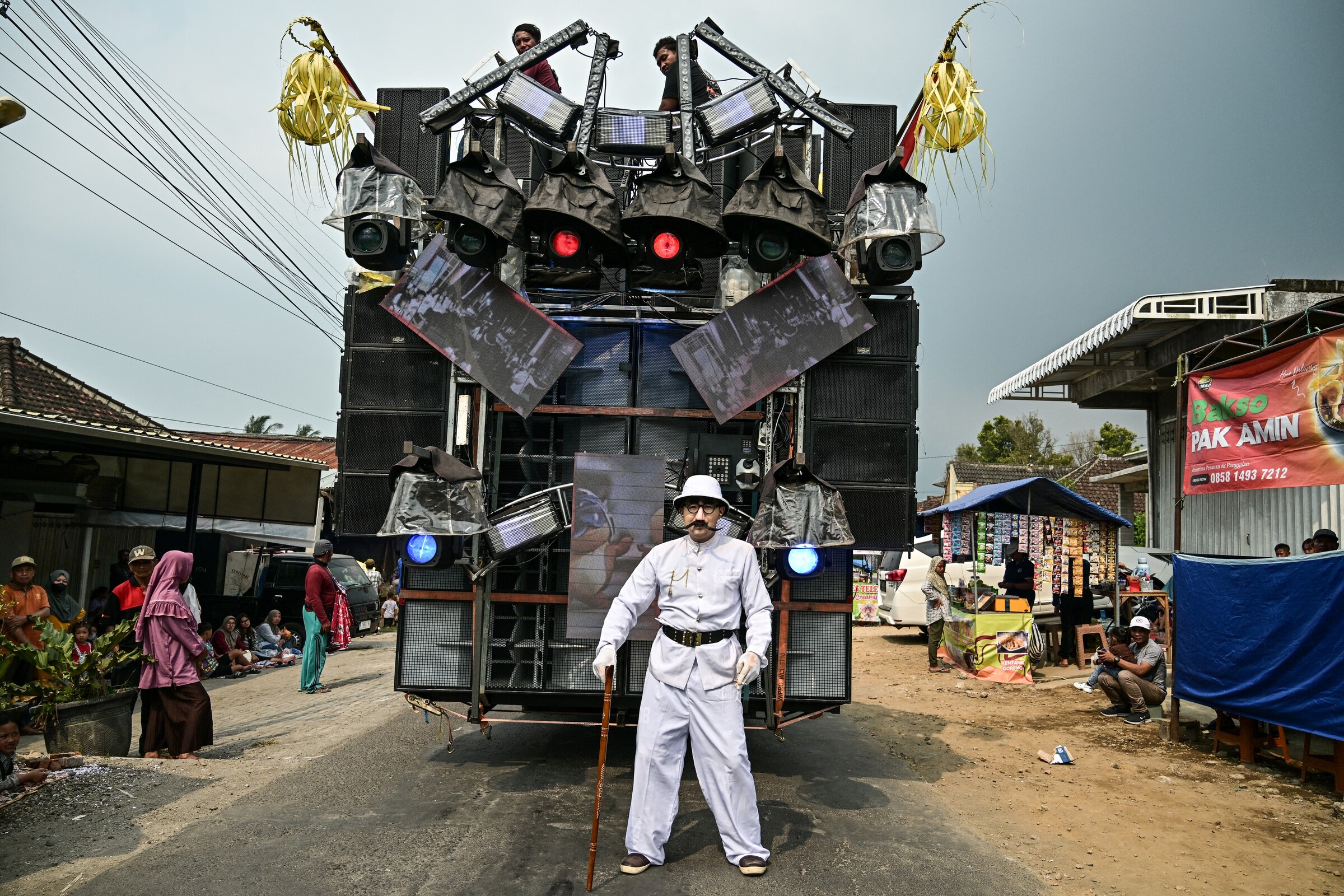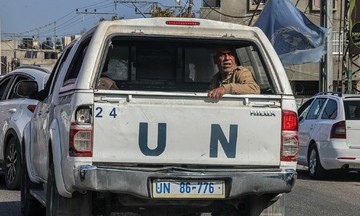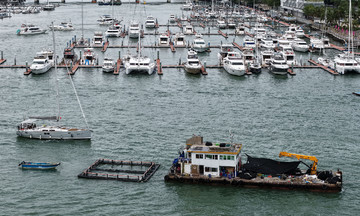Trucks loaded with loudspeakers have become a common sight across Java, Indonesia's main island. These mobile "sound towers," blasting traditional and electronic music for street events, are a nightmare for many locals who endure the intense noise and its negative health impacts.
"The music blares from 1 PM until 3 AM. They play the loudspeakers at full volume and drink alcohol," Ahmad Suliyat, a resident of Ngantru village in East Java, told AFP. "It's really disturbing."
 |
Residents cover their ears as a loudspeaker truck passes during an event in Malang, East Java, Indonesia, 9/8. Photo: AFP |
Residents cover their ears as a loudspeaker truck passes during an event in Malang, East Java, Indonesia, 9/8. Photo: AFP
According to the Jakarta Post, these "sound towers" originated in parts of East Java in the early 2000s, becoming popular entertainment at festivals, weddings, and religious events. Politicians even use them to draw crowds during campaigns.
In recent years, they've appeared at competitions, where supporters compete to create the loudest, most powerful sound systems, attracting thousands of spectators.
This trend has led to increasing complaints. Many East Java residents worry about the impact of noise pollution on vulnerable groups like the elderly, children, and those with pre-existing health conditions. Videos and photos shared on social media show cracked walls and broken roof tiles from the intense sound.
Authorities have acknowledged the health consequences of excessive noise. The World Health Organization (WHO) states that sounds above 85 dB can damage hearing with prolonged exposure, while sounds exceeding 120 dB can cause immediate harm.
Screenshots of noise-measuring apps posted online by Java residents show sound levels from these towers reaching 130 dB.
Local media reported in early August that a woman died from cardiac arrest, allegedly due to the loud music from sound towers at a festival she attended. Other attendees also reported hearing problems.
This prompted action from East Java officials. Governor Khofifah Indar Parawansa issued regulations on 6/8, limiting noise levels and restricting the time and location of sound tower operation.
East Java's government capped noise at 120 dB for fixed sound systems, while mobile systems used in parades or protests are limited to 85 dB. Mobile loudspeakers are prohibited near schools, hospitals, ambulances, and religious areas during services. Vehicles carrying loudspeakers must meet traffic regulations, and organizers need police permits.
"This move is for health and security. Noise regulations are necessary to avoid public disorder," Governor Khofifah stated.
However, the policy has drawn criticism from experts. Analyst Alie Zainal from the Malang School of Public Administration, East Java's second-largest city, said the regulations are unrealistic and lack scientific basis.
He argued that 120 dB still exceeds safe levels and the policy's success depends on enforcement. "If the police don't take strong action, these regulations are meaningless," Alie told the Jakarta Globe.
 |
An artist takes a photo in front of a loudspeaker-covered truck in Malang, East Java, Indonesia, 9/8. Photo: AFP |
An artist takes a photo in front of a loudspeaker-covered truck in Malang, East Java, Indonesia, 9/8. Photo: AFP
Alie's concerns seem valid. Sound towers in East Java continue to exceed noise limits, even at events attended by officials, due to lax enforcement. Sound tower owners argue they are meeting public demand and providing income for local businesses.
"I believe those who dislike the noise aren't locals," said David Stevan Laksamana, 40, who rents out sound systems in Malang. "In Malang, this industry employs tens of thousands of workers and boosts the economy."
Some, like 61-year-old Daini, believe sound towers are a tradition worth preserving, even though her house in Ngantru suffered cracked windows during an event last year. "People here enjoy these events," she said.
Others fear retaliation for complaining. Some sound tower owners have parked outside complainants' homes and blasted music for hours. Ahmad is among those who remain silent.
"I've never dared to complain to the village head," Ahmad said. "I just keep quiet. I'm afraid of being threatened if I speak up."
Nhu Tam (According to AFP, Jakarta Post)












